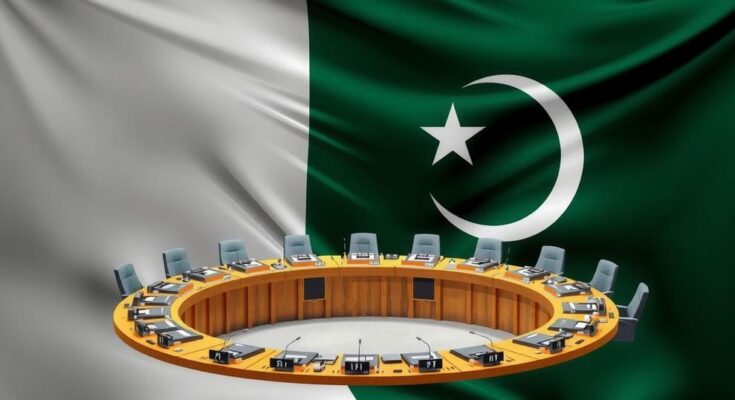Pakistan has commenced its eighth term as a non-permanent member of the UNSC, marked by the installation of its flag. Ambassador Asim Iftikhar Ahmad led this event, introducing Pakistan’s significant role in addressing international security issues and enhancing global cooperation. The nation will participate in vital committees and uphold its commitment to the UN Charter’s principles during its term, emphasizing peace and self-determination.
Pakistan recently celebrated the installation of its national flag in the United Nations Security Council (UNSC) chamber, marking the commencement of its eighth term as a non-permanent member for the period of 2025-26. The official unveiling coincided with Pakistan’s election in June, where it succeeded Japan for one of the two Asia-Pacific seats. This term not only allows Pakistan to influence critical discussions on global issues but also introduces unique challenges that the nation must navigate. Ambassador Asim Iftikhar Ahmad, the Alternate Permanent Representative of Pakistan, officiated the flag installation during the ceremony held at the UN Headquarters in New York, alongside representatives from Denmark, Greece, Panama, and Somalia, who also joined the Council.
As part of its duties, Pakistan will gain a seat on the ISIS and Al Qaeda Sanctions Committee, which plays a vital role in identifying terrorist entities and enforcing sanctions. The Security Council is composed of 15 members: five permanent members (Britain, China, France, Russia, and the United States) and ten non-permanent members, where five are replaced annually. Pakistan’s presence in this influential body underscores its commitment to maintaining international peace and security, given the Council’s authority to impose binding decisions and authorize military action where necessary.
Ambassador Ahmad emphasized Pakistan’s dedication to the principles outlined in the UN Charter, notably in fostering peaceful international relations and supporting self-determination for oppressed peoples. He noted the importance of multilateral cooperation, stating that addressing the underlying causes of conflicts and prioritizing dialogue is essential for effective conflict resolution. The ambassador expressed a firm resolve to collaborate with other Council members to pursue just, peaceful solutions to pressing issues and to uphold international law in all endeavors.
Moreover, he reiterated Pakistan’s moral obligation to those affected by conflicts as the nation seeks to cultivate a more secure environment globally. This involvement aligns with Pakistan’s commitment to enhancing sustainable peace and stability internationally, demonstrating its active role within the UN framework.
The United Nations Security Council (UNSC) is globally recognized as the foremost body responsible for maintaining international peace and security. It comprises 15 members, with five being permanent members and ten serving on a non-permanent basis. The non-permanent seats rotate periodically, allowing various nations to contribute to global discussions regarding pressing security matters. Pakistan’s election as a non-permanent member reflects its ongoing diplomatic efforts and strategic role in international relations, particularly in addressing issues concerning regional stability and global security challenges.
In conclusion, Pakistan’s installation of its flag at the UNSC marks a significant milestone as the country embarks on its eighth term as a non-permanent member. This opportunity not only empowers Pakistan to influence crucial international dialogues but also reinforces its commitment to peace, self-determination, and cooperative multilateralism. Ambassador Ahmad’s statements highlight a vision for proactive engagement in addressing global conflicts and a dedication to upholding the principles of the UN Charter, underscoring Pakistan’s sustained commitment to fostering a secure world.
Original Source: www.dawn.com




